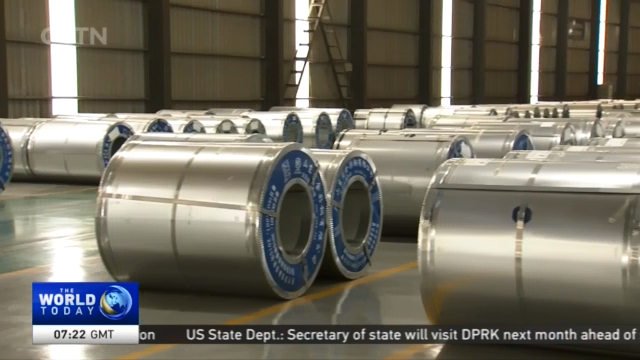
15:57, 27-Sep-2018
China-US Trade Tensions: Chinese steel makers face more trade barriers overseas
Updated
15:07, 30-Sep-2018
02:35

China's steel exports have continued to drop, hitting a record low at the start of 2018. This has come largely due to the ongoing trade tensions between the world's two largest economies. But now, some other Asian countries are also raising tariffs on Chinese steel. CGTN's Li Jianhua visited a steel factory in eastern China to find out more about their impact.
A steel plate being fed into a rumbling machine. This is the factory at Shandong Huijin Group, tucked away in a small town in east China's Shandong Province. On the long production line, the steel plates are galvanized - a common method used to tackle steel erosion. The galvanized steel products are then sold overseas. The company has a yearly capacity of 600-thousand tons, but the production now is only about one fourth of that.
ZHANG JIANFENG COLOR-COATED STEEL WORKSHOP MANAGER, SHANDONG HUIJIN GROUP "We have three production lines. This one produces fade resistant color steel, and it has a capacity of 150-thousand tons. Now it's working in full force. As for the other two production lines – one has stopped and the other one is working on again/off again."
After the US slapped tariffs on China's steel product exports, many Asian countries – where China has a large market share – also followed suit.
YU YONGQIAN GENERAL MANAGER, SHANDONG HUIJIN GROUP "Some Asian countries have also raised tariffs against China, and now we see more trade barriers overseas."
Yu adds they had been planning to explore the US market further, but now it seems impossible, and they are turning back to the domestic market.
But the company's founder is confident.
WEI LONGCHANG CHAIRMAN, SHANDONG HUIJIN GROUP "I see it as an opportunity because it can motivate us to upgrade our products. For one thing, we are working on new products to improve their values; for another, we are trying to find some other markets in the countries along the Belt and Road initiative."
Figures show China's steel exports stood at less than 30 million tons in the first five months of 2018, declining by 16 percent compared with the same period last year. And China's move to curb environmental pollution is also said to be behind the nation's declining steel production.
LI JIANHUA BINZHOU, SHANDONG PROVINCE "China's steel and aluminum exports hit bottlenecks years ago. Looking inward, the domestic market has been saturated; outward, the overseas markets are becoming harder to enter. Now Chinese companies with some assets are upgrading their products just to survive. LJH, CGTN, BINZHOU, SHANDONG PROVINCE."

SITEMAP
Copyright © 2018 CGTN. Beijing ICP prepared NO.16065310-3
Copyright © 2018 CGTN. Beijing ICP prepared NO.16065310-3